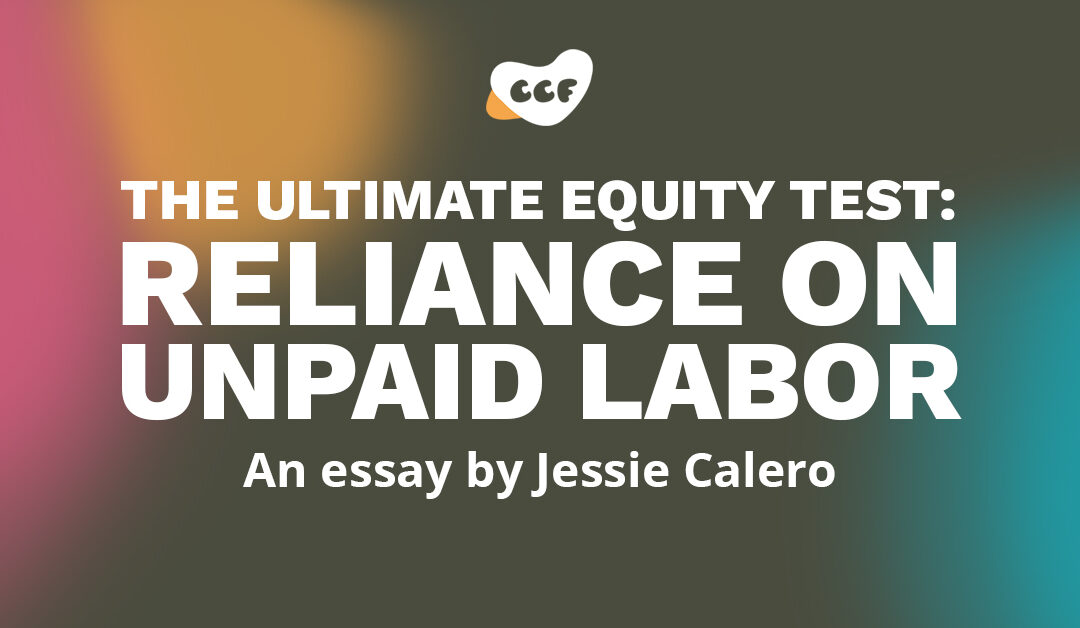By Jessie Calero, fundraiser and freelance writer
Among the most egregious practices that cause nonprofit organizations to fail the equity test is a reliance on unpaid labor.
Equity-minded organizations have become more focused than ever on identifying and addressing practices that perpetuate exclusion and prevent historically underrepresented communities from becoming leaders in the nonprofit sector.
Some have led the charge in examining biased hiring practices, inequity and secrecy in compensation, and historically white leaders and models of power.
However, within other organizations, almost nothing has changed.
Elaborate calls for feedback, lengthy surveys, and landscape assessments are conducted, published, and lead nowhere. Statements listing principles of inclusion are filled with meaningless platitudes with no benchmarks or measurable criteria to which organizations could be held accountable. Efforts to embrace inclusion, diversity, equity, and accessibility are built on a foundation of white supremacy culture. And, as is usually the case in a capitalist society, habitual hoarding of power and money overshadows principles of community and resource-sharing.
Among the most egregious practices that cause nonprofit organizations to fail the equity test is a reliance on unpaid labor. What’s even more concerning is that this is most common among professional development organizations.
As a member of one such organization, I recently received a Request for Proposals, soliciting content and educational materials to share with their membership. This request specifically highlights inclusion, diversity, equity, and access as central to the organization’s strategic plan.
They ask for fresh perspectives and innovation. They offer respondents the chance to write articles, create short learning videos, hour-long webinars, or intensive multi-day virtual workshops. They state that proposals can be submitted by members and non-members alike, from both new and experienced fundraisers from across the globe– allowing them to garner content from a wide array of diverse perspectives.
So, what’s the catch?
Applicants must agree to contribute their content “to the profession…with no monetary benefit or revenue share accruing to the contributor.”
Who is most likely to respond to an RFP requiring such an intensive level of work with absolutely no compensation in return?
- Fundraisers whose business model is supported by opportunities for “exposure” (these are the small percentage of fundraisers who are powerhouses in the philanthropic world, with book deals, massive mailing lists, sizable consulting fees, educational platforms, and other means of generating revenue);
- Fundraisers who make more income each year than is necessary to afford continually drastic increases in the cost of living (not to say nonprofit professionals should not be well-compensated for our work– but I don’t know many fundraisers in New Mexico who would fall into this category);
- Fundraisers who are part of a dual-income household, who may not be reliant on their own income to sustain themselves;
- Fundraisers from a background of family wealth, which could be used to supplement any loss in income from dedicating time to an unpaid project (in the voice of my inner Vu Le: these fundraisers probably have a donor-advised fund at a local community foundation…for which they receive an immediate tax deduction when they make a contribution, but are never legally required to actually distribute);
- Fundraisers with access to consistent and affordable childcare, generous paid leave, or other resources without which unpaid work would be untenable (again, not to say these things should not be available to fundraisers– but it is still not the norm).
A caveat: I’m sure there are many fundraisers who do not count themselves among any of the above-listed groups who choose to donate their time in order to provide resources to their peers. However, their brilliant work is being extracted, packaged, and platformed by well-resourced organizations who could absolutely afford to provide compensation for their work and who immediately leverage their content as part of a case for membership and registration fees, for which the organization’s costs were purely administrative.
A second caveat: Many more fundraisers, again, who may or may not fall into the above-listed situations, frequently donate their time, knowledge, and resources to other fundraising and nonprofit professionals in their community. Through presenting at low-cost or free regional workshops, informally organizing peer groups, and formally or informally mentoring fellow fundraisers in their region, these fundraisers give back to their profession in ways that embrace the mutual aid model. They offer their knowledge and expertise, understanding that other fundraisers in their community would do the same for them. These efforts are admirable and reflect cooperative, meaningful, and community-focused ways of sharing resources and building the nonprofit sector.
A third caveat: While this process does not explicitly exclude fundraisers of color, LGBTQ+ folks, disabled people, or other historically marginalized groups from adding their voices to the mix, it certainly does not make it easy for them to participate, given the financial and circumstantial barriers to doing so. If you make it difficult for these populations to contribute, you are more likely to produce content that centers the voices of white, straight, cisgender, and non-disabled professionals.
As a member of a local fundraising chapter, our programming continues to consist of a combination of donated and paid expertise. We have occasionally identified experts whose work would benefit our membership but at a cost that seemed unachievable. When a particularly compelling speaker or workshop series is outside of our budget? We fundraise to make up the difference so as not to pass our increased costs onto our attendees.
So, Association of Fundraising Professionals-Global, have you ever considered raising some money to start paying the people who create your revenue?

Jessie Calero
Jessie Calero (she/her/hers) is a life-long resident of New Mexico who earned her Bachelor and Master of Arts degrees from the University of New Mexico. With over 10 years of experience in nonprofit leadership and fundraising, Jessie serves as a development professional within a civil legal services organization in Albuquerque, New Mexico. She enjoys freelance writing and tackling home improvement projects in her spare time. As an autistic woman, Jessie also provides training focused on ableism and its impacts to nonprofit organizations and community businesses that want to prioritize accessibility, inclusivity, and universal design. She can be reached via email or on LinkedIn.

